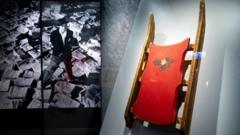The NWA 16788 meteorite, the largest of its kind, sold for $4.3 million, prompting Niger to investigate its export.
Mars Meteorite from Niger Sparks Controversy After Sale in New York

Mars Meteorite from Niger Sparks Controversy After Sale in New York
Niger's government raises concerns over the legalities of the auctioning of a rare Martian meteorite.
The discovery of a massive Martian meteorite, named NWA 16788, in Niger has ignited a storm of controversy after it was auctioned in New York for $4.3 million without the knowledge or consent of the Nigerien government. The same piece of rock, weighing 24.7 kilograms (54 pounds) and originating from Mars, was put on display at Sotheby’s last month, drawing attention for its size and beauty. However, Professor Paul Sereno, a palaeontologist with strong ties to Niger, has criticized the sale as unfair and potentially illegal, insisting that such significant pieces of national heritage should remain within Niger.
Amidst the widespread excitement that surrounded the auction, questions quickly arose regarding how the meteorite was exported from Niger, as reports suggested a lack of oversight and the possibility of illicit trafficking. Niger's government subsequently launched an investigation into NWA 16788’s journey from discovery to auction. Sotheby’s, however, asserts that they followed all necessary procedures, claiming that the meteorite was exported in compliance with international regulations.
According to an Italian academic article, the meteorite was initially uncovered in the Sahara Desert in the Agadez region by an unidentified meteorite hunter, after which it was reportedly sold to an international dealer. It later made its way to a gallery in Italy before being displayed in New York. Experts in meteorite trading and law have noted potential gaps in international agreements governing the regulation of extraterrestrial materials, raising complex questions about rightful ownership and cultural heritage.
The situation has garnered the attention of academic and cultural advocates, including Professor Sereno, who emphasizes the need for clarity in protecting Niger's heritage, which includes not just terrestrial artifacts but extraterrestrial finds as well. The ongoing situation echoes a similar dilemma faced by neighboring Morocco, which continues to grapple with the regulations surrounding numerous meteorites found on its territory.
While the fate of NWA 16788 remains uncertain, officials in Niger express determination to reclaim their natural treasures, sending a signal that the country seeks recognition and protection of its heritage on the global stage. As the Niger government moves forward with its investigation, this incident may mark a pivotal moment in the global conversation about the ownership and preservation of our planet’s—and even our solar system’s—most extraordinary items.
Amidst the widespread excitement that surrounded the auction, questions quickly arose regarding how the meteorite was exported from Niger, as reports suggested a lack of oversight and the possibility of illicit trafficking. Niger's government subsequently launched an investigation into NWA 16788’s journey from discovery to auction. Sotheby’s, however, asserts that they followed all necessary procedures, claiming that the meteorite was exported in compliance with international regulations.
According to an Italian academic article, the meteorite was initially uncovered in the Sahara Desert in the Agadez region by an unidentified meteorite hunter, after which it was reportedly sold to an international dealer. It later made its way to a gallery in Italy before being displayed in New York. Experts in meteorite trading and law have noted potential gaps in international agreements governing the regulation of extraterrestrial materials, raising complex questions about rightful ownership and cultural heritage.
The situation has garnered the attention of academic and cultural advocates, including Professor Sereno, who emphasizes the need for clarity in protecting Niger's heritage, which includes not just terrestrial artifacts but extraterrestrial finds as well. The ongoing situation echoes a similar dilemma faced by neighboring Morocco, which continues to grapple with the regulations surrounding numerous meteorites found on its territory.
While the fate of NWA 16788 remains uncertain, officials in Niger express determination to reclaim their natural treasures, sending a signal that the country seeks recognition and protection of its heritage on the global stage. As the Niger government moves forward with its investigation, this incident may mark a pivotal moment in the global conversation about the ownership and preservation of our planet’s—and even our solar system’s—most extraordinary items.

















